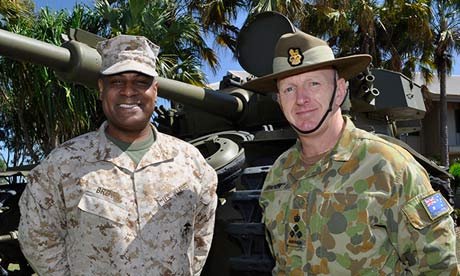Cracks appearing in US marines' charm offensive in Darwin
Locals are grumpy about the noisy aircraft and nervous about the marine battalion growing to 2,500 by 2017-18The thunder of fighter jets is fast becoming a key feature among Darwin’s dry season attractions.
Beer, backpackers, crocs and thongs are being joined by the ever-increasing roar of war machines overhead, leaving transient performers in town for the Mindil beach markets begrudgingly admitting it has become the "military capital of Australia".
One man who has lived in the north-east outskirts of Darwin for 40 years but does not want to be named grimaces as yet another US marine F/A-18 jet flies overhead from Royal Australian Air Force Base Darwin, temporarily rendering any conversation hopeless.
"That’s Darwin," he shrugs, once the noise has dissipated.
But it’s not the mix of multinational pilots in town for the RAAF’s largest annual combat training activity each June, Pitch Black, that has created the biggest stir among locals. Instead it is the 200-strong contingent of US marines based at Darwin’s Robertson Barracks and the fact they are paving the way for a full 1,100-strong battalion to arrive next year, increasing to 2,500 by 2017-18, that is making the most noise.
On Darwin’s main entertainment strip, Mitchell Street, socialising Americans from Lima Company, 3rd Battalion, 3rd Marine Regiment, are easily spotted at night in civilian clothes.
They stay together in groups of three or four...

..Basewatch member Justin Tutty...wants ground rules established regarding the fighter jets, transport aircraft and navy support vessels that will arrive to support them, particularly if it includes the MV-22 Osprey tilt rotor aircraft, commonly referred to as the “widow maker”, which has been involved in three crashes at the US’s third largest offshore military base at Okinawa, Japan, since 1998.
His case was highlighted recently when a botched training drill in Queensland resulted in two unarmed bombs and two inert bombs filled with concrete being dumped by US aircraft into deep waters in the Great Barrier Reef marine park, much to the outrage of local environmentalists.
"A lot of people are grumpy about noisy aircraft and there’s going to be more of that," Tutty says.
The marines are part of a US force posture initiative under which its presence will increase in northern Australia as it pivots its attention away from the Middle East and Europe, and its economic decline, and into the Indian Ocean and the east and south-east Asia regions.
ADF Commander 1st Brigade Brigadier John Frewen says it is a natural extension of the Australian/US alliance that has been in place for many years...
...Tutty fears the full battalion will be a riskier prospect than the small group that has been charming the locals so far.
A Deloitte Access Economics report commissioned by the ADF and released in April, Social Impact of rotations of up to 1,100 US Marines and associated equipment in Northern Australia, found that
...in Okinawa...seven cases of reported or alleged sexual assault cases between 1996 and 2012.
Australia too had experienced its own issues with the US military, including in 2001 when up to three cases of alleged sexual assault by visiting servicemen were reported to NT police.
Deloitte suggested there was a 1 in 20 chance of a sexual assault taking place in a period of six months by an 1100-strong force of marines in the NT......US military personnel deployed in Australia operate under the 1963 Status of Forces Agreement.
It holds them to account under Australian law for crimes committed within its borders, but also provides for limited circumstances when they could be charged under US military law instead.
University of Canberra government and law assistant professor, Dr Robin Tennant-Wood says there is a certain level of diplomatic protection afforded to military personnel, but there have been cases in the past when visiting US naval personnel have been returned to Australia to face trial after being accused of assault or various petty crimes.
Given that the rotation was announced as a "mark of friendship" between the two countries, however, the US would be keeping marines on a tight leash with short rotations.
But Tutty also wants assurance that Australia would not end up providing logistical support for US nuclear-capable "war machines" or have to tolerate the presence of illegal nuclear WMDs, and the stockpiling of depleted uranium and cluster munitions.
"I’m not ‘anti-American’. I support a defence force and I’m confident this co-operation can work, but it’s a difficult policy challenge," he says.
"If there is a future war that Australia doesn’t agree with, we’re in a position to find ourselves logistically supporting US deployment to that war zone."
http://www.theguardian.com/world/2013/jul/30/darwin-us-marines-too-close

 Forum
Forum

 Home
Home 

 Album
Album 

 Help
Help

 Search
Search

 Recent
Recent 

 Rules
Rules 

 Login
Login

 Register
Register





 Pages: 1
Pages: 1 

